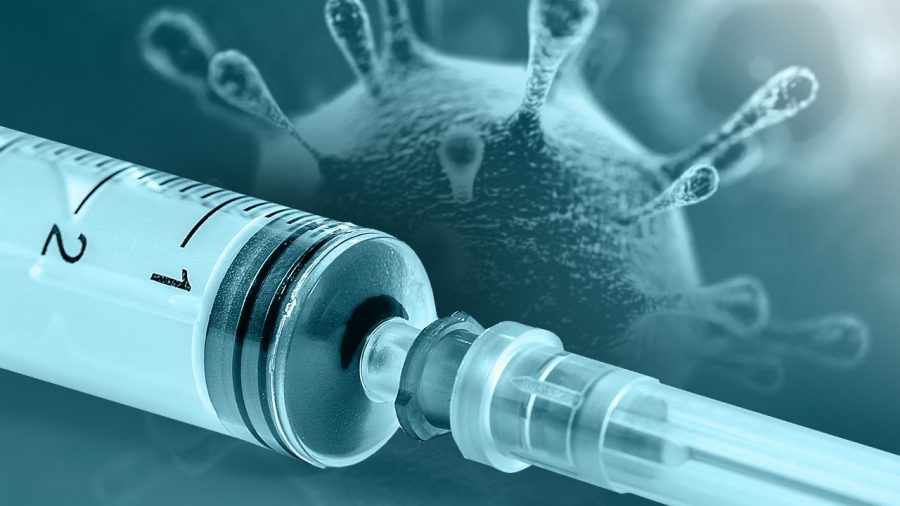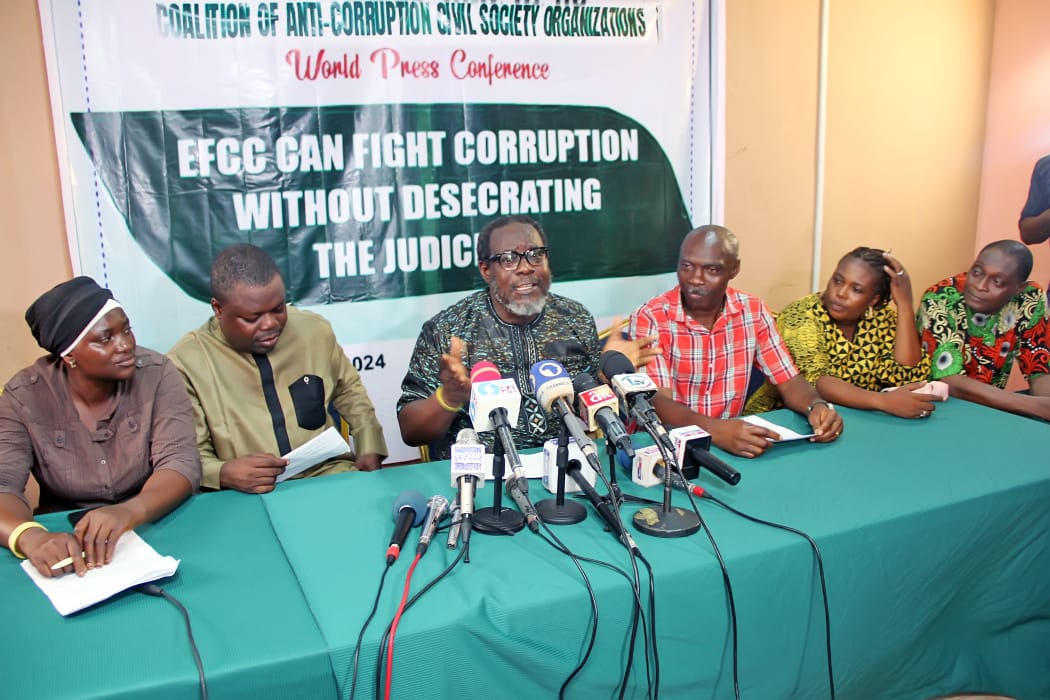Don’t desecrate the courts while fighting corruption, anti-graft CSOs caution EFCC, others
. Say ‘rush to arrest ex-Kogi Gov despite pending Appeal Court hearing suggests political persecution’
. Warn against ‘breaking a law to enforce another’
Anti-Corruption Civil Society Organisations have advised the Economic and Financial Crimes Commission not to desecrate the courts in the course of carrying out its constitutional role of fighting corruption.
The CSOs and human rights crusaders cautioned the EFCC and other anti-graft agencies against trampling on the rights of supposed suspects of corruption in order to avoid breaking a law to enforce another law.
The activists, who spoke at an emergency press briefing in Lagos on Thursday, noted specifically that the recent public face-off between the EFCC and a former Governor of Kogi State, Alhaji Yahaya Bello in Abuja, was “both unnecessary and unfortunate.”
The Executive Chairman of the Centre for Anti-Corruption and Open Leadership (CACOL), who addressed the press, suggested that the rush
by the EFCC to make an arrest, when the Court of Appeal hearing on its application to vacate the restraining order was just in a few days, might give credence to allegations of political persecution.
“Mr. Olukoyede is my friend. But if he begins to trample on the rule of law, then that’s the terminal point of our friendship,” Adeniran said.
The CSOs noted that the EFCC’s action on Wednesday was “tantamount to the agency preempting the outcome of its appeal and also violating a subsisting and valid court order to pause action pending the determination of the case before it.”
“Our layman’s understanding is that a Court of coordinate jurisdiction cannot assume superiority over another,” they noted.
Gbenga Soloki of the Centre Against Injustice and Domestic Violence, who also spoke, said civil societies in Nigeria would protest vehemently against any attempt to use the military to arrest an individual who had not been accused of treason.
“It is extremely disappointing to hear this afternoon that EFCC is threatening to involve the military in their desperation to forcefully or violently arrest an individual who has not been alleged of treason.
“Should that happen, we will be a laughing stock globally. Civil society will be active in protesting against such unforgivable infraction on our democracy should it happen as threatened. It should better not happen,” he said.
Adeniran stated, “We do not consider Yahaya Bello a saint, but even the devil deserves his rights under the law. Court documents at our disposal show that the former Governor had obtained a High Court restraining order on the EFCC not to arrest or prosecute him pending the determination of a case of the enforcement of his fundamental human rights, which the Commission has rightfully appealed with the intention of vacating.
“The Commission has done very well up to this point following the due processes of law because without vacating that order, it cannot proceed with arresting the suspect.
“According to available court documents, hearing on the appeal has been slated to come up on Monday April 22nd in Abuja. However, suddenly yesterday (Wednesday) the news of the foiled arrest of the former Governor by the Commission went viral. One would have expected the Commission to wait for the determination of its own appeal before going after the suspect.
“We think it is an abuse of court processes to ignore a court order still on appeal at the instance of the Commission and to obtain a warrant of arrest from another court on the same suspect.”
The CSOs urged the EFCC to fight, prevent and prosecute corruption cases strictly within the ambit of the law set up to regulate the interaction between them and corruption suspects.
They noted that laws, including the Nigerian criminal justice system regulations and court processes, were meant to be obeyed non-selectively by both state and non-state actors.
The CSOs recalled that when the current Chairman of the EFCC, Ola Olukoyede, came on board last year, one of his promises was to operate strictly within the rule of law.
“For those who are likely to misinterpret this intervention as it is their regular trademark, this goes beyond Yahaya Bello. Injustice to anyone should not be allowed to stand because it may be your turn tomorrow,” they noted.
The activists therefore urged the EFCC to revert to status quo antebellum pending the determination of its appeal and a vacation of the restraining order placed on it, saying “that is the way and dictate of the law.”
The press conference was attended by Comrades Debo Adeniran, Executive Chairman, Centre for Anti-Corruption and Open Leadership CACOL); Sina Loremikan, (Campaign Against Impunity); Declan Ihekhaire, (Activists for Good Governance); Gbenga Soloki, CADOV; Ochiaga Ohaneze, (Ohaneze Youth Council); Funmi Jolade, (Women Democratic Vanguard); Kola Abe, (Centre for Socioeconomic Rights); Ologun Ayodeji, (Transparency and Accountability Group); Femi Lawson, (Centre for Public Accountability) and Gbenga Ganzallo (Media Rights Campaign), among others.





 Business6 months ago
Business6 months ago
 celebrity radar - gossips4 months ago
celebrity radar - gossips4 months ago
 celebrity radar - gossips4 months ago
celebrity radar - gossips4 months ago
 Business3 months ago
Business3 months ago










